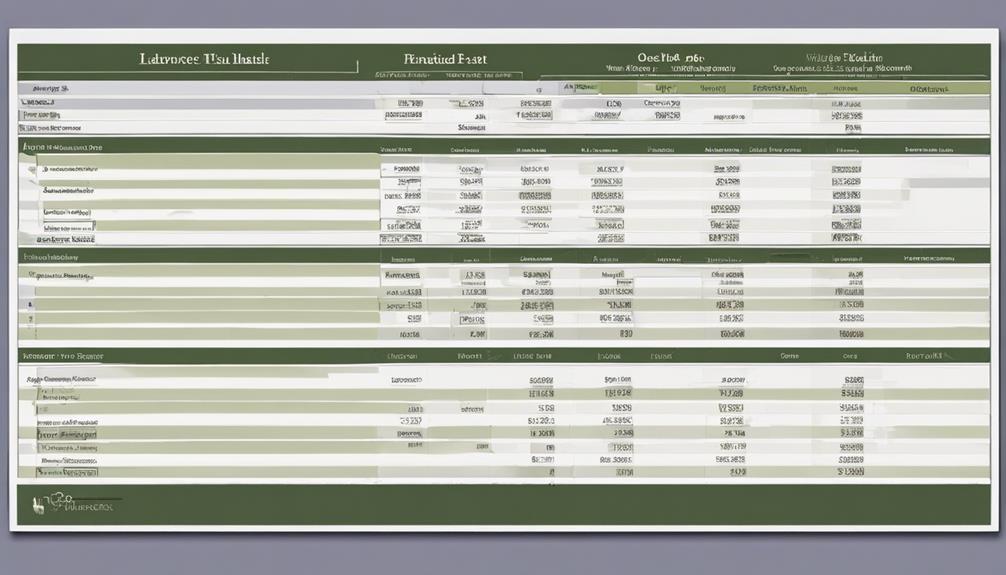We’ve all heard the famous saying: “Honesty is the best policy.” But what occurs when that honesty wavers in the world of finances? Wondering what happens when the truth takes a back seat in financial matters? Stay tuned to find out!
Financial infidelity, a breach of trust involving hidden money matters in a relationship, can shake the very foundation of a marriage. The repercussions of such deceit can be far-reaching, impacting not only the couple's financial stability but also their emotional well-being.
Let's explore how financial infidelity can serve as a catalyst for marital discord and potentially lead to the dissolution of a union.
Key Takeaways
- Financial infidelity causes trust issues and conflicts, leading to divorce.
- Courts consider financial deception in asset division and valuation during divorce.
- Child custody can be affected by financial dishonesty, impacting parenting arrangements.
- Seeking legal help is crucial to address financial betrayal and ensure fair outcomes in divorce.
Impact of Financial Deception on Marriage
Financial deception in marriage often sparks arguments, erodes trust, and hampers effective communication, profoundly impacting the stability of relationships. When one partner engages in financial infidelity, whether through hidden accounts, undisclosed debts, or clandestine spending, the breach of trust can be devastating. Trust, a foundational element of any marriage, is fragile and once shattered by financial deceit, can be challenging to rebuild. The revelation of such deception commonly leads to heightened conflict, increased suspicion, and a breakdown in communication. These consequences can pave the path to divorce, as the betrayed partner may struggle to move past the betrayal and rebuild a sense of security within the relationship.
Research indicates that over 50% of adults admit to committing financial infidelity, underscoring the prevalence of this issue in modern relationships. The impact of financial infidelity extends beyond mere monetary concerns, delving into the realms of emotional distress and relational turmoil. Couples facing such challenges must address them promptly to mitigate the risk of irreparable harm to the trust that underpins their partnership.
Legal Ramifications of Financial Infidelity

The impact of financial deception on marriage extends beyond relational dynamics, as it can have significant legal ramifications, particularly in divorce proceedings. When financial infidelity occurs, the consequences can be far-reaching, impacting various aspects of the legal process:
- Full Financial Disclosure: Courts typically mandate complete transparency regarding finances during divorce proceedings. Failure to disclose assets or income can result in severe penalties.
- Asset Division: Financial infidelity can directly influence how assets are divided between spouses. Courts may adjust the division based on the extent of the deception.
- Asset Valuation: Concealing assets can complicate the valuation process, leading to disputes over the true worth of marital property.
- Legal Remedies: In cases where financial infidelity has led to the dissipation of marital assets, legal remedies can be pursued. Courts may award damages or adjust asset division to address the misconduct adequately.
Understanding the legal consequences of financial infidelity is crucial for navigating divorce proceedings effectively and ensuring fair outcomes in asset division.
Division of Assets in Divorce Cases
When dividing assets in divorce cases, courts meticulously evaluate property, investments, and possessions acquired throughout the marriage. Factors such as the length of the marriage, contributions to the marital estate, and future financial needs are carefully considered in the division process. Marital assets encompass a wide range of items, including real estate, retirement accounts, businesses, vehicles, and personal belongings. Valuation experts may be brought in to assess the worth of more complex assets like businesses, intellectual property, or investments. Equitable distribution principles serve as a guide, aiming to achieve a fair outcome based on each spouse's contributions and financial situations.
| Hidden Assets | Division of Assets | Financial Infidelity |
|---|---|---|
| Undisclosed accounts | Property splitting | Secret investments |
| Offshore holdings | Investment sharing | Deceptive spending |
This table illustrates some common elements related to hidden assets, the division of assets, and financial infidelity that often come into play during divorce proceedings.
Child Custody Issues and Financial Infidelity

Moving from the evaluation of assets in divorce cases to child custody matters, our focus shifts to the implications of financial infidelity on parental responsibilities and family dynamics. When considering child custody issues in the context of financial infidelity, several key points emerge:
- Impact on Parental Suitability: Financial infidelity can raise concerns about a parent's honesty and financial responsibility, potentially influencing court decisions regarding custody arrangements.
- Stability of Child's Environment: The deceptive behavior associated with financial infidelity can create instability in a child's life, prompting questions about the deceptive parent's ability to provide a secure and consistent environment.
- Co-Parenting Challenges: Financial dishonesty can strain co-parenting relationships, hindering effective communication and decision-making processes essential for the child's well-being.
- Legal Intervention: Resolving financial infidelity issues in child custody cases may necessitate legal intervention to ensure that the child's best interests remain the central focus during custody determinations.
These factors underscore the significant impact of financial infidelity on child custody arrangements, highlighting the complexities that arise in balancing financial responsibilities with co-parenting relationships.
Seeking Legal Recourse for Financial Betrayal
In cases of financial betrayal, seeking legal recourse becomes imperative for addressing the implications of financial infidelity in divorce proceedings. Legal recourse for financial infidelity typically involves pursuing claims related to dissipation of marital assets.
It's crucial to ensure full financial disclosure during divorce proceedings, as courts expect transparency, and failure to disclose financial misconduct can lead to severe penalties.
The impact of financial betrayal on various aspects of divorce, such as asset division, asset valuation, alimony, and child support, can significantly influence legal outcomes. Seeking legal guidance from experienced professionals is essential for effectively addressing financial betrayal and navigating the complexities associated with financial infidelity in divorce cases.
Frequently Asked Questions
How Do You Prove Financial Infidelity?
We prove financial infidelity by scrutinizing bank statements for hidden accounts or undisclosed transactions, detecting secret credit cards, loans, or investments, and identifying suspicious spending patterns. Expert testimonies and income discrepancies are crucial evidence.
Does Infidelity Matter in a Divorce Settlement?
Infidelity matters in a divorce settlement as it can impact asset division, alimony, and child support. Courts consider such behavior when determining fair outcomes. Full financial disclosure is crucial for an equitable settlement.
Is Lying About Finances Grounds for Divorce?
Lying about finances in a marriage can severely damage trust and communication. If financial deception affects asset division or support agreements, it could be considered grounds for divorce. Seeking legal advice is crucial in such situations.
How Serious Is Financial Infidelity?
Financial infidelity can devastate trust and jeopardize financial stability in relationships. It leads to deceit and betrayals that erode the foundation of partnerships. Consequences may extend to legal ramifications, impacting asset division and support arrangements.
Are Instances of Financial Infidelity Common in Relationships with Sugar Daddies?
Instances of financial infidelity are not uncommon in relationships with sugar daddies. It’s important to know your legal rights and options, including seeking legal tips for divorcing sugar daddy.Understanding the financial dynamics of such relationships and protecting yourself legally is crucial for a smooth separation.
How Does Financial Infidelity Affect Divorce Proceedings?
Financial infidelity can serve as significant financial grounds for divorce due to the betrayal and loss of trust it can cause between spouses. In divorce proceedings, it can impact asset division, alimony, and child support as it reveals dishonesty and hidden financial information, leading to more contentious negotiations.
Conclusion
In the intricate dance of marriage, financial infidelity acts as a poison, eroding trust and stability. Like a hidden dagger cutting through the fabric of partnership, it leaves wounds that may never fully heal.
Addressing these issues head-on is crucial to prevent irreparable damage. Just as a skilled surgeon must carefully remove the infected tissue to save the patient, couples must confront financial dishonesty to preserve the health of their relationship.










